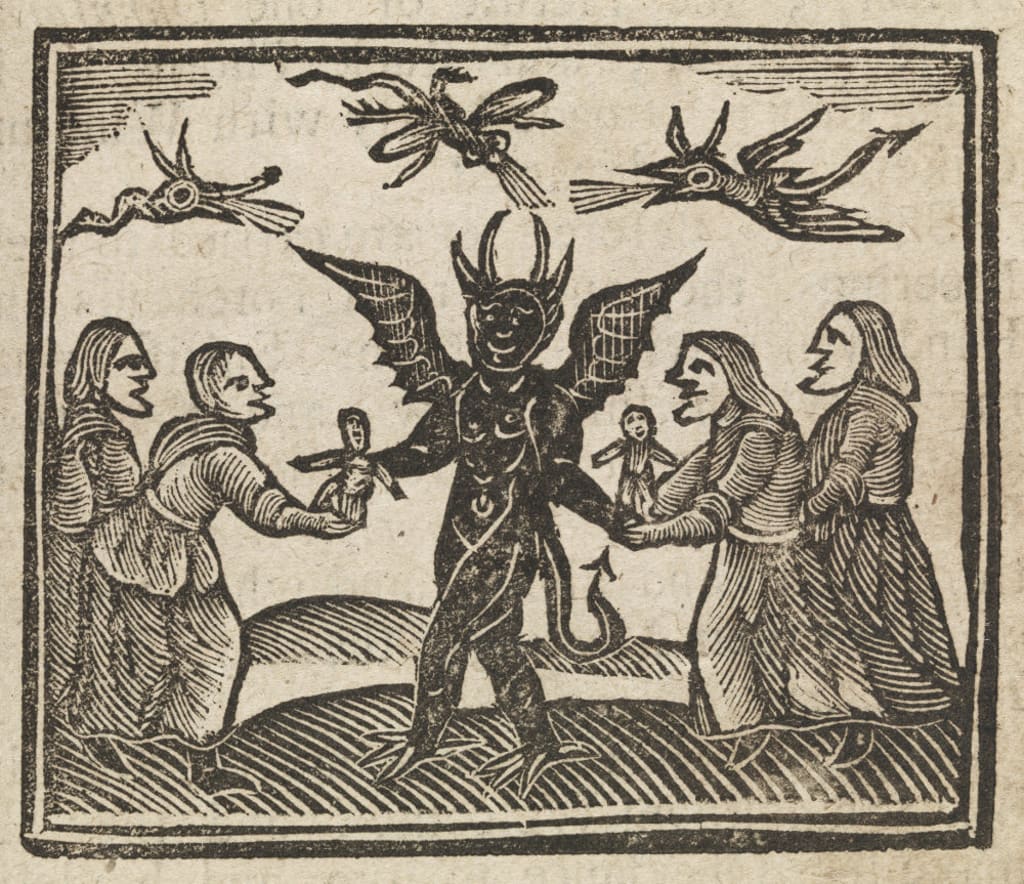Opening the Vortex
Satanic Reason and a Critique of a Critique

I am a member of The Satanic Temple and an active member of Satanic San Francisco. My defense of the Seven Fundamental Tenets is based on my knowledge and my own reasons for joining and participating. I am not acting or speaking on behalf of either The Satanic Temple or Satanic San Francisco by writing or publishing this article. I am simply explaining.
The TST Tenets Critique was published in April 2018 by a writer under the name Ben Dean, characterized as “Chairman.” I have made no attempt to clarify or confirm this identity or title, as it has no bearing on the arguments involved. I freely acknowledge that I write under a pseudonym and have no title to speak of. Here is a link to the original post.
I will try to respond as effectively as possible to arguments presented. Once again, I represent only myself, with strictest possible adherence to reason and the truth. A few short excerpts will be included for reference.
1. “…So essentially this sentence says nothing other than be nice when you feel like it or be an arsehole as long as you can justify it. Isn’t that what people generally do anyway, act how they feel justified to do?”
The word reason refers to the reality of cause and effect. In terms of morality it means to take responsibility for the consequences of your actions and consciously choose to make the best ethical decisions in all situations. It places the responsibility of ethics on the self, in a Nietzschean sense, it removes the notion that an authority can somehow determine right and wrong through authoritarianism.
It’s also quite telling that the author cited a blog post exploring the meanings of compassion and empathy in an attempt to devalue them as ethical guides. The post cited actually provides pretty good working definitions of those words which could have clarified the intention of the original first tenet if the reader was willing to accept that intention. The subjectivity of empathy and compassion isn’t a free pass to forego reason as the basis for ethics, nor is the aspirational nature of ethics in general. What the first tenet means is that we are all smart enough to reason through the consequences of our actions and take responsibility for them. We don’t need a god, or any other authority, either human or superhuman, to dictate morality for us.
Here’s a link to the definitions the original author posted.
2. “…If justice is defined by the leaders of TST, are these leaders elected by vote to speak for the group? If not, how are they accountable? otherwise are these individuals not just dictators telling those beneath them what to do?”
The simple answer to this question also highlights the same problem with this line of argument as highlighted above: Justice is not dictated by the authority of anyone. Justice is dictated by reason. No, reason is not some buzzword TST made up to avoid dictating its members’ morality, it is a simple word with a perfectly clear definition. Members of TST tend to join or support the organizations actions based on their agreement with TST’s policies, not the other way around. For example, people who support abortion rights might find themselves moved by TST’s method of abortion rights activism, or people who are against corporal punishment in schools might feel compelled to support TST’s anti-corporal punishment campaigns. If a TST member changes their notion of some ethical or political question based on their association with TST, it would have to be as a result of their own changes in reasoning, not based on any authoritarian dictation.
3. “…This I think is actually a worthy one! However there are a few instances where we might draw a line in the sand to make exemptions, like mental illness or even stepping in during addictions.”
Oh a worthy one, I’m glad you approve. The objections you’ve offered are some of the most well-explored questions in philosophy, and I’m a little surprised you didn’t just cite some of them in your critique. Natural Law, The Golden Rule, the Theleman Law, and the Wiccan Rede are all examples of attempts to nail down clearly the boundaries of our rights to act freely without harming others. Essentially, they all say the same thing: do whatever you want as long as you don’t hurt anyone else. Your right to act freely doesn’t extend onto anyone else’s person or their own freedom. And yes, this also applies to consent laws such as those governing children, intoxicated persons, and the mentally ill. A person with diminished mental or physical capacity is protected from the responsibility of certain actions precisely in an attempt to protect their bodily autonomy until such time as they reach adulthood, sober up, or otherwise develop the ability to make such decisions for themselves.
4. “...How often is the freedom of others to speak and think differently not observed by members of TST? When TST are offended, which often springs them into action with their ‘pursuit for justice’ they do so in a way that will cause the most offence to the other group while hiding behind their tenets and black robes!”
To be perfectly honest, I’m not totally clear on what the author is referring to here. TST’s social and political activism to date has focused on abortion rights, evidence-based mental health treatment, the separation of church and state, and the anti-corporal punishment movement. All of these things and the reasoning behind them can be found in TST’s public statements and in the legal record. It seems like this author has chosen to use “offended” as some sort of a blanket term describing public activism in general. Once again, “offense” as used in the tenet (and in the dictionary) isn’t some random meaningless word, it refers to the unpleasant feeling caused by unfamiliar or personally distasteful material or words.
The relevance of free speech and offense in this context goes back to reason. What it means is that right and wrong are not defined by our feelings, not mine, not yours, not your mother’s, not even Lucien’s or the Dark Lord Lucifer himself. Right and wrong are defined by reason.
5. “…To “unjustly encroach” – again another phrase that leaves things most open to interpretation. Just in the same way as with justice, who defines what is unjust? The individual? The group?”
Once again, the words “unjustly encroach” can only be considered open to interpretation if the reader is refusing to acknowledge the definition of justice. As for the notion that TST somehow encroaches on the rights of other Satanists who don’t agree with our views, TST has never denied the existence of other Satanists or interfered with their right to believe whatever they want. It seems pretty clear that this author feels encroached upon by the existence of TST, or in other words, he feels offended, and is attempting to make a moral issue out of his feelings of offense.
6. “…The first use of the word belief would suggest one of a spiritual nature that would fit into the subjective and so be outside of scientific understanding anyway. This description would fit with the majority of religious and occult practices. But hang on, don’t TST describe themselves as a religion? Or is that only when it suits in a legal matter!!”
A vast majority of Satanists are atheistic Satanists. This includes the Church of Satan, The Satanic Temple, other LeVayan groups, and countless independent Satanic thinkers, practitioners, and what have you. The notion that science is some fuzzy idea subject to everyone’s opinions belongs back with Fundamentalist Christianity, not with modern independent thinkers in the Satanic movement. I’m a little shocked I even have to say this; that our beliefs should conform to science means accepting evidence-based medical practices, evidence-based political policy, and evidence-based evolutionary science and environmental policy. It means not falling for scam artists, and it especially means not accepting false equivalences between opinion and fact. The truth is not the halfway point between two opinions. The truth is not even in consensus, not in The Satanic Temple, and not between you and your most respected friends. The truth can be found in data, in empiricism, and in reason.
7. “…It’s the idea of admitting our faults. I agree with this point, however many Satanist, will see it as a sign of weakness and harmful to their own ego.”
Once again, no one is forcing you to conform to the Seven Fundamental Tenets. If you feel empowered by denying all of your faults and treating yourself as an infallible being, go right ahead. However, if you want to experience true power in life, I cannot recommend highly enough the process of self-assessment and self-improvement. I’ve learned a great deal from writing this response, and I will improve myself based on that learning. I feel apologetic about how long it is, and I will try to be more concise in the future. There have been many occasions in life when I have gotten carried away by my feelings, or fallen for beliefs that weren’t really scientifically supported. My experience of power in life is supported by my ability to examine evidence and adjust my beliefs and my behavior in accordance with what I learn.
And finally, if you find the meanings of compassion, wisdom, nobility and justice to be meaningless fluff, that’s really on you. Philosophers have certainly argued about these words, but their meanings have been hammered out through millennia of both arguments and use.
The fact that anyone could reach adulthood without understanding the meaning of the word “reason” is a serious indictment of the education system and of mainstream morality. Very few of us were born and raised Satanists, even those brought up in the most modern non-religious households are still affected by mainstream Judeo-Christian beliefs that permeate our schools and other public institutions. If you want to deny this, you have no place to be judging anyone else’s rationality or logical reasoning.
But don’t mistake others’ commitment to reason-based ethics and evidence-based policy as an encroachment on your own rights. No one is stopping you from flopping around in a fog of ignorance, no right, no wrong, driven entirely by your own feelings and whims. Just keep in mind if you ever want an abortion, The Satanic Temple is defending your rights. If you ever want to enter a public courthouse in the United States without listening to the sniveling passive aggression of Christian prayers, The Satanic Temple is defending your rights. If you want your children to learn in a public school without being preached to by homophobic creationists, The Satanic Temple is defending your rights. That is what the seven tenets mean.
If you consider this foolish, remember The Satanic Temple has had legal victories in Florida, Oklahoma, and Mississippi, and ask yourself what kind of results your version of rationality has produced for you lately.
Here’s a link to the original Seven Fundamental Tenets.
Now if you’ll excuse me, I’m really anxious to get back into a dark-hooded robe and chant some mumbo-jumbo over a campfire while sipping Pinot Noir and using Girl Scout cookies as communion wafers.
About the Creator
KJ Thomas
I'm chasing after whatever this whole thing is building to. You can talk back to me here: https://agnostic.com/member/KJThomas and my profile artwork was made by my good friend Tabitha: https://www.instagram.com/tabithaslander/
Enjoyed the story? Support the Creator.
Subscribe for free to receive all their stories in your feed. You could also pledge your support or give them a one-off tip, letting them know you appreciate their work.






Comments
There are no comments for this story
Be the first to respond and start the conversation.